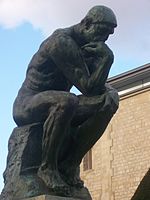
Quietism in philosophy sees the role of philosophy as broadly therapeutic or remedial.[1] Quietist philosophers believe that philosophy has no positive thesis to contribute; rather, it defuses confusions in the linguistic and conceptual frameworks of other subjects, including non-quietist philosophy.[2] For quietists, advancing knowledge or settling debates (particularly those between realists and non-realists)[3] is not the job of philosophy, rather philosophy should liberate the mind by diagnosing confusing concepts.[4]
- ^ Bakhurst, David (2005). The Oxford companion to philosophy. Ted Honderich (2nd ed.). [Oxford]: Oxford University Press. p. 779. ISBN 978-0-19-153265-8. OCLC 62563098.
quietism, philosophical...Philosophy's proper role is therapeutic, rather than constructive: the philosopher diagnoses conceptual confusions.
{{cite book}}: CS1 maint: date and year (link) - ^ Virvidakis, Stelios; Kindi, Vasso (2013). "Quietism". Oxford Bibliographies Online Datasets. doi:10.1093/obo/9780195396577-0184.
- ^ Miller, Alexander (2019), "Realism", in Zalta, Edward N. (ed.), The Stanford Encyclopedia of Philosophy (Winter 2019 ed.), Metaphysics Research Lab, Stanford University, retrieved 2021-04-10,
Philosophers who subscribe to quietism deny that there can be such a thing as substantial metaphysical debate between realists and their non-realist opponents (because they either deny that there are substantial questions about existence or deny that there are substantial questions about independence).
- ^ Bakhurst, David (2005). The Oxford companion to philosophy. Ted Honderich (2nd ed.). [Oxford]: Oxford University Press. p. 779. ISBN 978-0-19-153265-8. OCLC 62563098.
philosophy should not aspire to produce substantive theories (e.g. of the nature of meaning, the foundations of knowledge, or of the mind's place in the world), adjudicate disputes in science or mathematics, make discoveries...Philosophy's proper role is therapeutic, rather than constructive: the philosopher diagnoses conceptual confusions. Although the results of such therapy can be profoundly liberating, philosophy does not itself advance human knowledge.
{{cite book}}: CS1 maint: date and year (link)
© MMXXIII Rich X Search. We shall prevail. All rights reserved. Rich X Search
